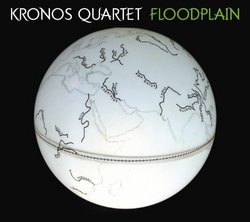| All Artists: Kronos Quartet Title: Floodplain Members Wishing: 7 Total Copies: 0 Label: Nonesuch Original Release Date: 1/1/2009 Re-Release Date: 5/19/2009 Genres: Special Interest, Classical Styles: Chamber Music, Historical Periods, Classical (c.1770-1830) Number of Discs: 1 SwapaCD Credits: 1 UPC: 075597982886 |
Search - Kronos Quartet :: Floodplain
 | Kronos Quartet Floodplain Genres: Special Interest, Classical
With Floodplain, Kronos Quartet draws together work from the Middle East, Africa, South Asia and Eastern Europe in particular from those nations whose external conflicts and internal divisions have, for many westerners, of... more » |
Larger Image |
CD DetailsSynopsis
Product Description With Floodplain, Kronos Quartet draws together work from the Middle East, Africa, South Asia and Eastern Europe in particular from those nations whose external conflicts and internal divisions have, for many westerners, often overshadowed their rich musical legacies. With these twelve specially commissioned tracks, Kronos Quartet explore centuries-old traditions while also presenting adventurous new music by young composers who sample and reinterpret aspects of their indigenous cultures. Some of these pieces have been adapted from the religious, folk, classical and popular music of Egypt, Lebanon, Azerbaijan and Iraq, among other places. Others were written for Kronos Quartet by such contemporary artists as the Palestinian electronic / hip hop collective Ramallah Underground, who Kronos founder David Harrington discovered via myspace, and the Serbian composer Aleksandra Vrebalov. Similarly Requested CDs
|
CD ReviewsBeauty and intensity, music from Muslim lands... R. Hutchinson | a world ruled by fossil fuels and fossil minds | 11/08/2009 (5 out of 5 stars) "...mainly Muslim lands, that is. This is overwhelmingly folk-inflected world music, and the songs come from Egypt, Palestine, Lebanon, Iraq, Azerbaijan, Kazakhstan, Ethiopia, Iran, Turkey, India and Serbia. Every one of the 12 pieces was commissioned and either written, or in most cases arranged, specifically for Kronos. Most have a very traditional sound, despite their translation into string quartet arrangements. The main exceptions are "Tashweesh (Interference)," by the Palestinian group the Ramallah Underground, which features electronics, and the 22-minute "...hold me, neighbor, in this storm..." by the 39-year-old Serbian composer Aleksandra Vrebalov, which concludes the album. It is by far the longest piece, and the only one which falls into the category of contemporary classical -- it is a quintessential example of postmodern pastiche, with church bells, Islamic calls to prayer, and disparate elements representing the cultural diversity of Serbia. The title FLOODPLAIN refers to the central role of rivers in many of the cultures of Eurasia and Africa -- the Nile, the Tigris & Euphrates, and the Indus, just to name a few. But the unifying theme is also the wars America has been waging in the Middle East and Southwest Asia and the desire of the musicians to transcend the cultural barriers that exist among all the peoples involved by sharing the stunningly beautiful music. The feelings expressed in the music reveal the common humanity of those who play, and those who hear. Some highlights of the album for me include Hank Dutt's viola solo in "Raga Mishra Bhairavi: Alap" (the alap is the opening of a raga), David Harrington's violin in the Azeri song "Mugam Beyati Shiraz," John Sherba's violin solo in the Turkish "Nihavent Sirto," Jeffrey Ziegler's cello played in the style of a Kazakh horsehair fiddle in "Kara Kemir," and the soulful melodies throughout. The Ramallah Underground piece is quite powerful, as is the 1970s Iraqi song "Oh Mother, the Handsome Man Tortures Me." This is a superb album! It is probably the most similar to NIGHT PRAYERS (see my review) of all those in the now extensive Kronos catalog. It would be wonderful if it contributed to the goal of breaking down barriers of hatred and stereotypes and hostility. Short of that FLOODPLAIN can bring some probably unfamiliar beauty into your life. Peace, shalom, salaam, namaste. (verified purchase from Amoeba Records, San Francisco)" As the World Shrinks, We Expand Our Ears Dr. Debra Jan Bibel | Oakland, CA USA | 05/24/2010 (5 out of 5 stars) "The Kronos Quartet is no stranger to world music beyond international classical composers. They have, for instance, provided "Pieces of Africa" and "Caravan" and have collaborated with such musicians as Hassan Hakmoun, Foday Musa Suso, Hamza el Din, Taraf de Haïdouks, Kayhan Kalhor, and Zakir Hussain. "Floodplain" is yet another tour of distant lands in Europe, Asia, and Africa, this one 79 minutes long, and the Kronos perform the various styles of music with aplomb and sensitivity. Azerbaijan is represented with the vocal talents of Alim and Fargana Qasimov, and a composition by Muguam Beyati Shiraz. The Qasimov track is the live version of a tune that appears in the Kronos Quartet's album for Smithsonian Folkways/Aga Khan Trust, "Rainbow". Hank Dutt, the Kronos violist, with support of Terry Riley and Wu Man, provides an alap improvisation of a morning raga inspired by sarangi master Ram Narayan [compare with Narayan on Maestro's Choice, Music Today, CD A 91009]. We hear Arabic musical forms from Egypt, Palestine, Lebanon, and Iraq, as well as an unusual African-influenced lullaby from Iran, that provide challenges of less familiar, different scales and quarter tones. Compositions from Kazakhstan, Serbia, and Ethiopia round out the album. Other than the Turkish dance Nihavent Sirto, most of the music is meditative, that is, slow and modal. The Ethiopian track includes a modern instrument akin to the ancient harp with its buzzing sound. The album will appeal mainly to the fan of traditional world music; but the quartet arrangements show how international forms can be incorporated in Western classical traditions, as the Indonesia-inspired music of Lou Harrison and the Latin and Jewish elements of Osvaldo Golijov. The Kronos Quartet are global musicians, and they continually educate us and expand our ears. Hallelujah!"
|

 Track Listings (12) - Disc #1
Track Listings (12) - Disc #1
